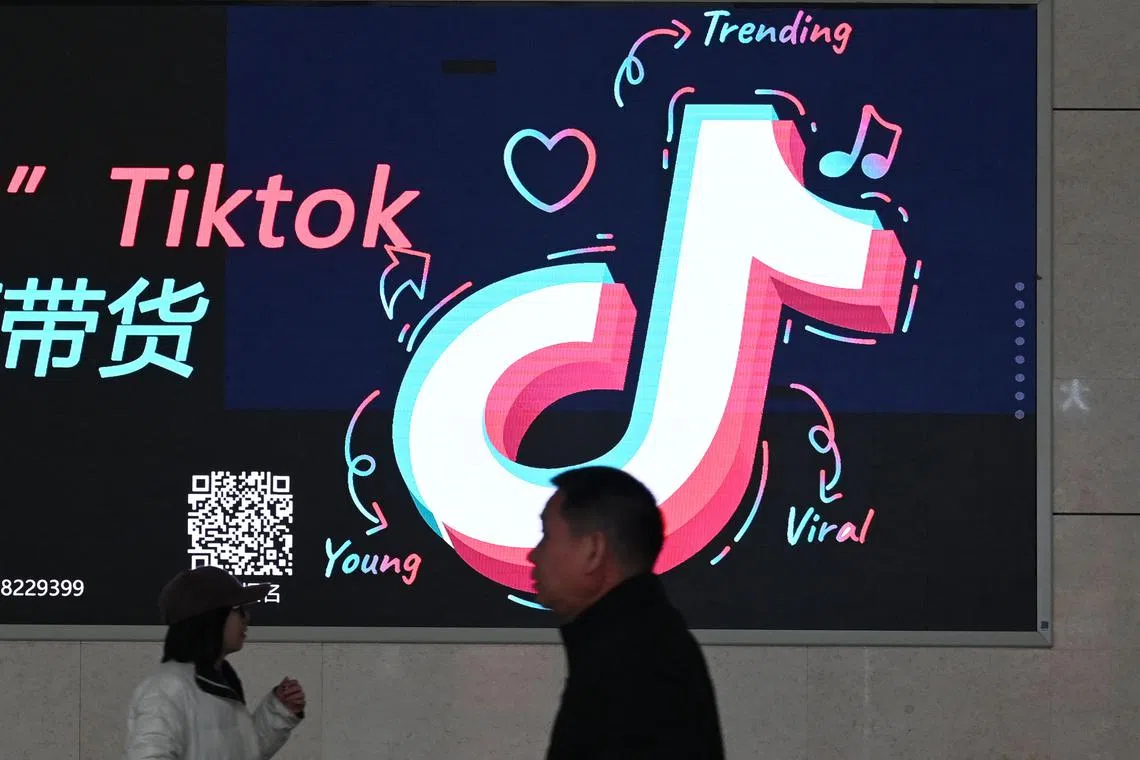TikTok’s US future hangs in balance at federal court
Sign up now: Get ST's newsletters delivered to your inbox

A TikTok ban would most likely provoke a strong response from the Chinese government and further strain US-China relations.
PHOTO: AFP
Follow topic:
WASHINGTON - TikTok will attempt to convince a federal court on Sept 16 that a law requiring the video-sharing app to divest from its Chinese ownership or face a ban in the United States is unconstitutional.
The fate of Americans’ access to TikTok has become a prominent issue in the country’s political debate, with Republican presidential candidate Donald Trump opposing any ban of the wildly popular app.
Democratic President Joe Biden, whose Vice-President Kamala Harris is running against former president Trump,
ByteDance, TikTok’s parent company, has stated it has no plans to sell TikTok, leaving the app’s legal appeal – focused on US guarantees for free speech – as its only option for survival.
A ban would most likely provoke a strong response from the Chinese government and further strain US-China relations.
A three-judge panel of the US Court of Appeals for the DC Circuit will hear arguments from TikTok, ByteDance and a group of users.
They will primarily contend that the law violates free speech rights.
The judges will decide the case in the coming weeks or months, but regardless of their decision, the case is likely to reach the US Supreme Court.
“There is no question: The Act will force a shutdown of TikTok by Jan 19, 2025,” TikTok’s appeal stated, “silencing those who use the platform to communicate in ways that cannot be replicated elsewhere.”
TikTok also argued that even if divestiture were possible, the app “would still be reduced to a shell of its former self, stripped of the innovative and expressive technology that tailors content to each user”.
TikTok asserts that “the Constitution is on our side”, as it pushes for a ruling that would favour the app and its 170 million American users.
The US government counters that the law addresses national security concerns, not speech, and that ByteDance cannot claim First Amendment rights in the US.
“Given TikTok’s broad reach within the United States, the capacity for China to use TikTok’s features to achieve its overarching objective to undermine American interests creates a national security threat of immense depth and scale,” the US Justice Department wrote in its filing.
The US argues that ByteDance could and would comply with Chinese government demands for data about US users, or yield to Chinese government pressure to censor or promote content on the platform.
‘Vote for Trump’
TikTok first faced scrutiny under Trump’s administration, which tried unsuccessfully to ban it.
That effort was halted when a federal judge temporarily blocked Trump’s move, citing in part the potential infringement of free speech rights.
Trump has since changed his position.
“For all of those that want to save TikTok in America, vote for Trump,” he said in a video post last week.
In a measure of the app’s popularity, Mr Biden’s re-election campaign created a TikTok account earlier in 2024.
Mr Biden has since stepped aside from his re-election bid, but Ms Harris, running in his place, also maintains a presence on the app, having embraced social media as a means to communicate with younger voters.
The new effort signed by Mr Biden was designed to overcome the previous legal hurdles Trump faced, but some experts believe the US Supreme Court will have difficulty allowing national security considerations to outweigh free speech protections.
Professor Carl Tobias of the University of Richmond School of Law said much of the US side’s national security arguments are sealed, which “complicates efforts to evaluate” them.
“However, the US Supreme Court has generally been very cautious about accepting national security arguments when government regulation restricts First Amendment rights, especially involving the internet,” he added. AFP

